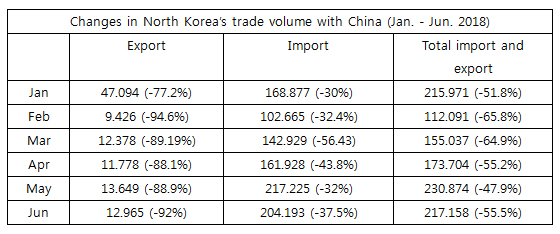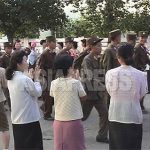
■ Exports Drop by 90%
Last year, the Kim Jong-un regime focused on nuclear and missile upgrades, carrying out a total of 17 ballistic missile firing tests and detonating a nuclear bomb 10 times more powerful than the one dropped on Hiroshima. In response, the UN Security Council strengthened sanctions by three steps, further restricting North Korean trade. Since then, we have worked with our partners in North Korea to investigate the effects of the sanctions and observe their emerging effects.
This past February, reports of the sanctions’ effects became increasingly severe. We received information that coal mines had stopped operations, trading companies had closed their business, electricity had been shut off, distribution had been cut, and that goods were no longer being sold in the markets.
The culprit behind the domestic market’s failure was China. Responsible for a whopping 90% of North Korea’s international trade, China’s decision to institute full-scale sanctions was a crippling blow to North Korea’s economy. To demonstrate this point, let us look at the following trade statistics from before and after the sanctions.
According to monthly trade statistics released by the Customs Authority of China, exports from North Korea to China totaled $94.26 million in February of 2018, down 94.6% from February the year before. In March, North Korea's exports totaled $ 12,378,000, down 89.2% from the year previous. The following month, exports fell even further, to $ 11,767,000, down 88.1%. To put this massive decrease in perspective, North Korea's total exports to China in 2016 equaled approximately $2.55 billion.
The economic sanctions targeted North Korea’s most productive industries. First, exports of textiles, seafood, coal, iron, silver, copper and nickel were all banned. Secondly, the sanctions prohibited all UN member countries from granting working permits to North Korean laborers. Additionally, any North Koreans already working abroad were, in principle, to return to their country within two years.

▲January-June China-NK trade statistics. Trade was severely hit by sanctions.
Exports to North Korea were also significantly restricted. As a result, exports of petroleum products such as kerosene and gasoline fell by nearly 90 percent from 4.5 million barrels in 2017 to less than 500,000 barrels since January of this year. Furthermore, exports of industrial machinery and transport vehicles were also banned entirely.
When the United Nations initially imposed the sanctions there was a strong concern that China and Russia would, once again, refuse to fully implement the sanctions. To evaluate the credibility of the sanctions myself, I visited North Korea’s Chinese border for a total of four weeks, from July to October last year. There, I found that the "authenticity" of China's sanctions went well beyond expectations. On the road to the North Korean border, Chinese guards conducted a heavy check for smuggled goods. All customs procedures were strict and there was no solicitation for bribes.
Following the release of UN Security Council Resolution 2375 in September of last year, China’s ministry of commerce issued an order giving North Korean businesses and individuals located in China, as well as joint ventures between North Korean and Chinese companies outside of its borders, 120 days to close. The ministry’s order was strictly enforced, as all North Korean restaurants in China were given until January 9 to shut down. China’s operations in North Korea were also affected, with Chinese companies withdrawing from North Korean mines and commercial fisheries. To counter the government measures, however, the joint ventures moved to transfer ownership to Chinese partners and, following the recent summit meetings, the North Korean restaurants in China were allowed to reopen.
Following the release of UN Security Council Resolution 2375 in September of last year, China’s ministry of commerce issued an order giving North Korean businesses and individuals located in China, as well as joint ventures between North Korean and Chinese companies outside of its borders, 120 days to close. The ministry’s order was strictly enforced, as all North Korean restaurants in China were given until January 9 to shut down. China’s operations in North Korea were also affected, with Chinese companies withdrawing from North Korean mines and commercial fisheries. To counter the government measures, however, the joint ventures moved to transfer ownership to Chinese partners and reopened. Smugglings through the loopholes in the border are hard to stop. But the scale of all these is not big enough to hinder the sanction so much.
Russia also seemed to implement more stringent sanctions than expected. According to an April 2018 study conducted by Dr. Iriya of Waseda University, an estimated 30,000 North Korean workers in Russia’s Far East region were returning to North Korea. Although the North Korean workers were allowed to see out the length of their contracts, under UN sanctions, further authorizations were illegal.
Russia also seemed to implement more stringent sanctions than expected. According to an April 2018 study conducted in the area of Primorsky Krai including Vladivostok and Sakhalin by Iriya, a visiting scholar of Waseda University, an estimated 30,000 North Korean workers in Russia’s Far East region were returning to North Korea one after another, it was hard to see them in person.
Thanks to its overseas laborers, the North Korean government takes in an estimated $180-280 million each year. Due to sanctions, however, this will have been greatly reduced.
I estimate that the importation of foreign currency due to the dispatch of overseas workers is about 178 billion to 268million dollars for the year, mainly for the rest of the world. This would have been greatly reduced by sanctions.
Thanks to its overseas laborers, the North Korean government takes in an estimated $180-280 million each year from Russia and China. Due to sanctions, however, this will have been greatly reduced.
Next Page : "I cannot eat and live"- Abandonment of Duty...


![[PHOTO REPORT] Winter, people strive to overcome the water crisis by drinking river water](https://www.asiapress.org/rimjin-gang/wp-content/uploads/2018/07/20150506_asiapress_01_X500-150x150.jpg)






















